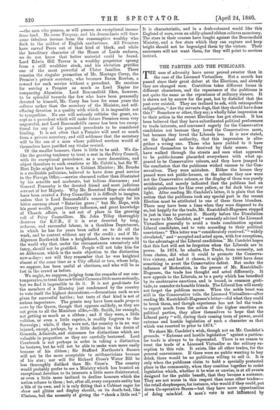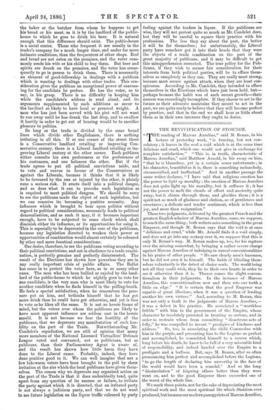THE PARTIES AND THE PUBLICANS. T HE uses of adversity have
never proved sweeter than in the case of the Licensed Victuallers. Not a month has passed since their great defeat at the Elections, and already they are changed men. Contrition takes different forms in different characters, and the repentance of the publicans is not quite the same as the repentance of ordinary sinners. It is shown not by sorrow for the past, but by disbelief that the past ever existed. They are inclined to ask, with retrospective indignation, "Are thy servants dogs, that they should have done this ?" Somehow or other, they say, a wholly false impression as to their action in the recent Elections has got abroad. It has been believed that they have subordinated political preferences to trade interests, and canvassed eagerly for the Conservative candidates not because they loved the Conservatives more, but because they loved the Liberals less. It is now stated, on the highest authority, that this impression is alto- gether a wrong one. Those who have yielded to it have allowed themselves to be deceived by their senses. They have walked through the streets and seen what appeared to be public-houses placarded everywhere with what ap- peared to be Conservative colours, and they have jumped to the conclusion that the publicans wished success to the Con- servatives. They were mistaken. Either the houses they passed were not public-houses, or the colours they saw were not the Conservative colours, or the display of them was purely accidental, and merely indicated that the publican had an artistic preference for blue over yellow, or for dark blue over light. After reading Mr. Candelet's letter, it is plain that the notion that the publicans took any special part in the recent Election must be attributed to one of these three blunders. There may have been a time when they were disposed to do so, but happily for the trade, Mr. K.natchbull-Hugessen stepped in just in time to prevent it. Shortly before the Dissolution he wrote to Mr. Oandelet, and " earnestly advised the Licensed Victuallers generally to avoid a trade combination against Liberal candidates, and to vote according to their political convictions." This letter was " considerately received," " widely circulated," and " accepted and acted upon, with few exceptions, to the advantage of the Liberal candidates." Mr. Candelet hopes that this fact will not be forgotten when the Liberals are in power. In 1874, he admits, the Trade, from necessity, not from choice, did what it could to promote the Conserva- tive victory, and had it chosen, it might in 1880 have done something to avert the Conservative defeat. But under the influence of Moderation, in the person of Mr. Knatchbull- Hugessen, the trade has thought and acted differently. It now appeals to the Liberals, as to a party which has benefited by its unobtrusive exertions, and is bound, in common grati- tude, to consider its humble friends. The Liberal lion will surely not forget the publican mouse. When the noble beast was still in the Conservative toils, the Licensed Victuallers—after reading Mr. Knatchbull-Hugessen's letter—did what they could to break them, and though experience has not led the trade to expect much from the action of the higher emotions on political parties, they allow themselves to hope that the Liberal party " will, during their coining term of power, avoid extreme and hostile legislation of such a character as that which was resorted to prior to 1874."
We share Mr. Candelet's wish, though not on Mr. Candelet's grounds. " Extreme and hostile legislation" against a particu- lar trade is always to be deprecated. There is no reason to treat the trade of a Licensed Victualler as the solitary ex- ception to this rule. It exists, like all other trades, for the general convenience. If there were no public wanting to buy drink, there would be no publicans willing to sell it. It is only when the publicans claim to hold a specially protected place in the community, when they combine together to resist legislation which, whether it be wise or unwise, is at all events designed for the public benefit, that they become a nuisance. They are not worse in this respect than some other trades— the retail shopkeepers, for instance, who would if they could, put down Co-operative Stores—but they have more opportunities of doing mischief. A man's vote is not influenced by
the baker or the butcher from whom he happens to get his bread or his meat, as it is by the landlord of the public- house to which he goes to drink his beer. It is natural enough that this difference should exist. The public-house is a social centre. Those who frequent it are usually in the trader's company for a much longer time, and under far more intimate conditions, than the frequenters of other shops. Beef and bread are not eaten on the premises, and the voter com- monly sends his wife or his child to buy them. But beer and spirits are drunk on the premises, and the voter has conse- quently to go in person to drink them. There is necessarily an element of good-fellowship in dealings with a publican which is wanting to dealings with other trades. This con- sideration gives the publican an exceptional power of canvass- ing for the candidate he prefers. He has the voter, so to say, in his grasp. There is no difficulty in keeping him while the candidate's address is read aloud, and its arguments supplemented by such additions as occur to the landlord as likely to have local or personal weight. A man who has just been served with his pint will not want to run away until he has drunk the last drop, and to swallow it hastily in order to get out of hearing would be to sacrifice pleasure to politics.
So long as the trade is divided by the same broad lines which divide other Englishmen, there is nothing irritating in all this. If at one corner of the street there is a Conservative landlord retailing or improving Con- servative oratory, there is a Liberal landlord retailing or im- proving Liberal oratory at the other corner. Each publican either consults his own preferences or the preferences of his customers, and one balances the other. But if the trade agrees to put all political convictions aside, and to vote and canvas in favour of the Conservatives or against the Liberals, because it thinks that it is likely to be favoured by the one or injured by the other, it plainly runs a serious risk. It erects itself into a political danger, and so does what it can to provoke such legislation as is required to meet political dangers. We should be sorry to see the publicans made the object of such legislation, but we can conceive its becoming a positive necessity. Any influence which is brought to bear upon politics without regard to political considerations, necessarily leads to political demoralisation, and as such it may, if it becomes important enough, have to be subjected to some check which shall diminish either its influence, or its opportunities for using it. This is especially to be deprecated in the case of the publicans, because any legislation directed to weaken their power or opportunities of combination would almost certainly be coloured by other and more fanatical considerations.
Our desire, therefore, to see the publicans voting according to their political convictions, and not in obedience to a trade combi- nation, is perfectly genuine and perfectly disinterested. The result of the Elections has shown how powerless they are in any really important crisis of public affairs. The Ballot has come in to protect the voter here, as in so many other cases. The man who has been bullied or cajoled by the land- lord of the public-house to which he nightly goes to vote for one candidate, is the very man who is most likely to vote for another candidate when he finds himself in the polling-booth. He feels a special satisfaction, when he remembers the pres- sure put on him, and bethinks himself that he has got more drink than he could have got otherwise, and yet is free to vote as he likes all the same. It is not an heroic frame of mind, but the voters over whom the publicans are likely to have most apparent influence are seldom cast in the heroic mould. It is not because we fear the hostility of the publicans, that we deprecate any manifestation of such hos-
tility on the part of the Trade. Notwithstanding Mr. Candelet's repudiation, we are still of opinion that many more members of the National Licensed Victuallers' Defence League voted and canvassed, not as politicians, but as publicans, than their Parliamentary Agent is aware of, and the result has shown how little harm they have done to the Liberal cause. Probably, indeed, they have done positive good to it. We can well imagine that not a few lukewarm voters have been brought to the poll by sheer irritation at the airs which the local publicans have given them- selves. The reason why we deprecate any organised action on the part of the Trade is that it does undoubtedly tend, quite apart from any question of its success or failure, to irritate the party against which it is directed, that an irritated party is not always a judicious party, and that we do not want to see future legislation on the liquor traffic coloured by party
feeling against the traders in liquor. If the publicans are wise, they will not protest quite so much as Mr. Candelet does, but they will be careful to square their practice with his professions. The less they say about the past, the better it will be for themselves ; for unfortunately, the Liberal party have somehow got it into their heads that they were the objects of a trade combination on the part of the great majority of publicans, and it may be difficult to get this misapprehension corrected. The true policy for the Pub- licans, if they wish to secure fair consideration for their interests from both political parties, will be to efface them- selves as completely as they can. They are really most strong, because most secure against attack, when they are least con- spicuous. According to. Mr. Candelet, they intended to efface themselves in the Elections which have just been held, but— perhaps because the habit was of such recent growth—their success was exceedingly incomplete. If they choose to act in the future as their advocate maintains they meant to act in the past, we are quite ready to believe that they will become perfect by practice, and that in the end we shall hear as little about them as in their own interests they ought to desire.



































 Previous page
Previous page